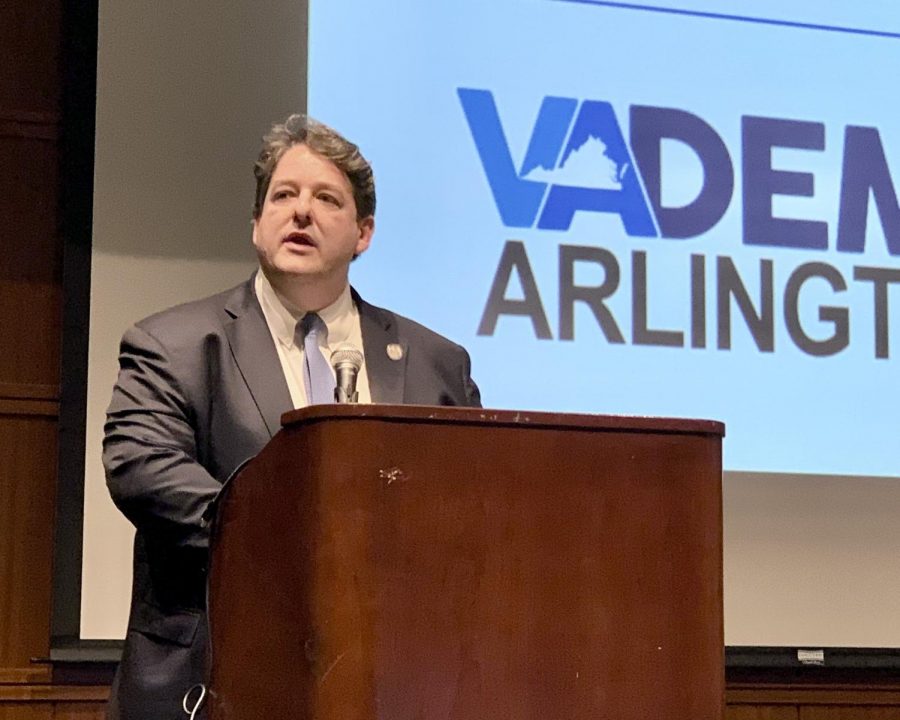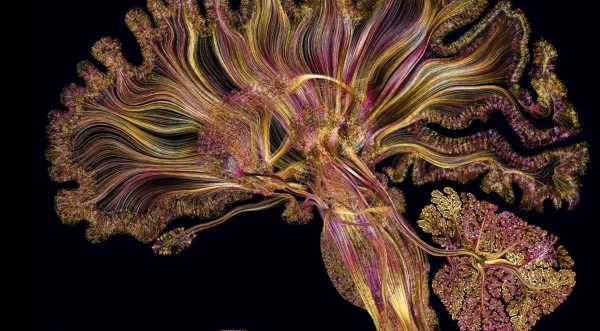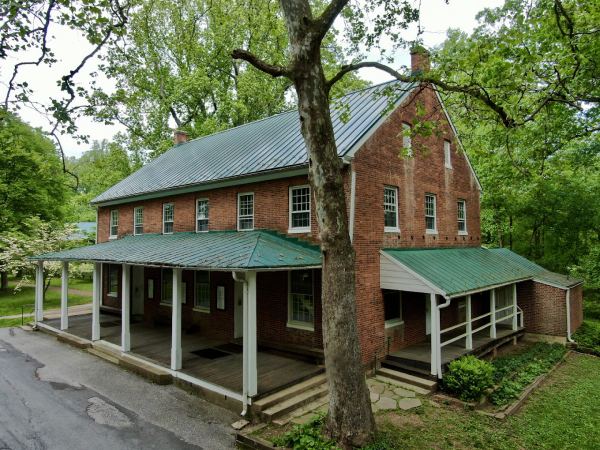Virginia delegate Alfonso Lopez on voter engagement in local politics
Delegate Alfonso Lopez speaking to a gathering of Democrats in Arlington, VA
December 15, 2021
State and local elections decide much of your day-to-day life, including everything from choosing school curriculums to fixing neighborhood potholes. However, these elections have historically lower engagement and turnout than national elections.
In the state of Virginia, elections for all state offices are held in odd-numbered years in which there is no Presidential or Congressional election. Using data collected from the Virginia Department of Elections, the average voter turnout in Presidential election years was 70.28%, while in odd-numbered election years, without a President or Congressional member on the ballot, the average turnout was only 38.34%. Turnout rates in mayoral elections are even lower than in state races. According to data collected by Portland State University’s “Who Votes for Mayor?” project, the mean voter turnout of mayoral elections in America’s 30 largest cities was only 22.73%, with Dallas, Fort Worth, and Las Vegas having turnout rates of under 10%. These elections also tended to overrepresent older voters, finding that the average age of the voting population is 15.13 years older than the average age of the total adult population in the same region.
But why should you care about local politics? I spoke to Delegate Alfonso Lopez (D), who represents the 49th District in the Virginia House of Delegates about his thoughts on voter engagement in local politics.
Q: “What is the Virginia House of Delegates and what does it do?”
A: “The Virginia House of Delegates is the longest-serving legislative body in the New World. We are over 400 years old—I think 403 years old—and everything we know about legislative democracy in the United States and in America came from Virginia and the House of Burgesses in Jamestown, and we have been in continual existence since Jamestown … We are the legislature for the Commonwealth of Virginia, and we deal with state policy and government. What we do is pass legislation and set policy for everyone in Virginia from everything from education, to healthcare issues, to social safety net issues, to the environment, renewable energy, criminal justice reform … We deal with everything under the sun in terms of policy except for foreign relations, which is the purview of the US Congress and the federal government. Federal policy dictates, as we see in the Constitution, the federal government sets the policy at one level. Virginia or a state can always go further and stronger. So, there’s a reason why Republicans will demonize California a lot, … like for the auto industry in the 60s and 70s and 80s, California would pass state laws and state regulations that were much more stringent than what the federal government did. That bound the industry in a way that was hard for the auto industry to deal with, and they weren’t going to have two sets of cars that they would produce, so they had to comply with what California did because it went further than what the federal government did on certain areas of catalytic converters and auto safety issues. So,o states can actually do a lot of good in terms of policy and regulatory policy in a way that sometimes pushes the federal government along.”
Q: “How do state and local governments impact our day-to-day lives, and specifically the day-to-day lives of high school students?”
A: “School funding. We provide the lion’s share of federal pass-through money. It goes to the states, to the localities, to help with schools. But also, we set the standards. So, with SOL—standards of quality, standards of learning—we set the policy around schools in Virginia. And then, local governments will go even further in terms of local school boards, dictating the policies about how they will implement the state and national policies at the local level. There’s some wiggle room, and the ability for local government, local school boards to figure out how they will do what’s best for their community within the prism of what the national and state policy perspectives might be. And then, everything from road safety to the environment, and clean air standards, and safe drinking water, and job creation, and economic development—all of these things are affected by state and local politics. So, every individual in Virginia is affected by the work of state and local government, and it affects every aspect of someone’s life.”
Q: “In Virginia, the average voter turnout in off-year elections since 2000 was only 38.34%, as opposed to 70.28% in presidential election years in the same timeframe. What do you think explains this disparity and what can be done to change it?”
A: “We have elections every year in Virginia, so we are a unique state in that, in a Presidential election year, you’ll have around 74, 75 percent overall turnout of eligible voters. And then, we elect our Governor and the General Assembly in odd years. So what will happen is the year after the Presidential [election], we’ll have a Governor’s election, and you’ll have 45 to 55 percent turnout, and that’s a 20 percent drop from, in a good year, the Presidential election cycle. And then, the year after that, two years after the Presidential, you’ll have a Congressional, maybe a US Senate candidate on the ballot. And then, you’ll have turnout fluctuate between 46 and 55 percent turnout, and that’s still a 20% drop from Presidential election years. But then, the year after that, when we have elections in the state, that’s the year we elect all four Constitutional officers, like the Clerk, and the Commissioners, the Revenue, and the Sheriffs, and then also, we represent local government, and then we also elect the House of Delegates and the State Senate—State Senate is four years. In the, what we call ‘off-off-year’ elections, turnout goes from 74, 75 percent in a Presidential [election] down to 27 percent to 34 percent in an off-off-year election, when we’re voting for the House of Delegates, and the one year that we vote for state Senate. So you have a significant difference and disparity in voter turnout…So, what do you do about that? You have to do a better job of explaining to folks why their vote matters. You have to do a better job of educating folks about voting, and you have to try and make voting a habit amongst young people early in their lives…Because that’s the only thing that’s going to save us, I think. Embracing a more dynamic form of civic education earlier and more often to get people excited about voting.”
Q: “Most of the news exposure of everyday Americans focuses on national politics. What are some ways that people can stay informed about state and local issues?”
A: “Well, this is a pet peeve of mine. Back in the ‘50s, ‘60s, ‘70s in Virginia, you had over 25, 35, 40 columnists and reporters, who just covered the Virginia General Assembly. That’s all they did. And today, you can count them on less than two hands. I think there may be 7 to cover the General Assembly on a regular basis. And that’s a function of there being a significantly larger number of local or regional newspapers than exist today. So, every large town in Virginia had its own newspaper, just 40 or50 years ago. As local media has gone away, so has coverage of local government and state government. You can stay informed because there are still reporters who cover local governments and state governments. That’s not as much as there should be. The Washington Post has one or two dedicated reporters who cover the general assembly, and they also have a couple of people who cover politics and local government in Northern Virginia, but it’s not nearly what it used to be. Then you have some other papers in Virginia, like The Virginian-Pilot, The Richmond [Times-Dispatch], that will cover [local politics], but it’s not to the granular level that it was in the past. There are a lot of online newsletters and magazines and periodicals that are covering a lot now, like the Virginia Mercury and the Virginia Cardinal, but we could be doing a lot better. … Another good thing to use in Virginia is something called VPAP, the Virginia Political Action Project. They have a newsletter that aggregates all of the Virginia policy and politics, articles into, online newsletter … That’s a great resource for Virginia.”
Q: “What is the importance of voting in state and local elections?”
A: “Just it matters. 2017—the House Democrats picked up 15 seats in the House of Delegates. And that got us to 51/49 in the House of Delegates. We weren’t in the majority, but we were just beneath the majority. Shelly Simonds, in Newport News, won her election by one vote. And the Republicans…I think, pulled a couple fast ones and called into question a couple of ballots…such that after not one, but two audits and recounts, they were tied. And according to the state Constitution, you had to then take both individuals’ names and put them in a ceramic bowl, and choose who the winner was going to be. And after winning the election by one vote, and shenanigans by the Republicans, the Republican won by one vote. And what does that mean? That means we did not pass the DREAM Act. We did not pass environmental protections. We did not pass social safety net protections. We did not pass criminal justice reform issues, or issues of racial equity, for a year, two years, before we could have and before we did in 2019, 2020. So that’s two years of people who were not helped. That was two years of teachers not having a raise. And so, the idea that every vote counts, I have seen up close and personal why it’s so very important that people vote. And this is not an uncommon occurrence. Jim Scott…represented Falls Church for decades. When he first ran for office, he won his election by one vote. They called him landslide Jim for years, but it happens more than you would think.”
Q: “Voter turnout in local elections among younger voters is much lower than among older voters. What would you say to young voters who may not be as enthusiastic about state and local elections?”
A: “That local elections have much more of an impact on your lives than national elections do. And that if you care about school funding or higher education funding, if you care about a woman’s right to an abortion, if you care about the environment, local and state government will have a considerably more direct influence on how your life is lived than the federal government will. I’ll also say that one of the pieces of legislation I’m very proud of is, I passed a bill in the last General Assembly term where it made it so that you could pre-register at the age of 16 to vote in Virginia. You’re not allowed to vote until you’re 18, of course, but part of the barrier for young people voting is that people sometimes have a hard time maneuvering the registration process. And there are deadlines when you can register prior to an election. We try to make it as easy as possible for people to do that, by making it easier to do it through the DMV, but there’s also a way to do it through schools. And what I did was, I said as folks are at the age of 16 and 17, we want to make it as easy as possible for people to vote when they become 18. So let’s allow them to pre-register when they’re juniors and seniors in high school. That way, it’s much more easy for them when they’re 18.”
Q: “Many high school students are too young to vote, but still are interested in getting involved in state and local politics. What advice would you give someone who wants their voice to be heard, but is too young to vote?”
A: “Volunteering on a campaign…getting your voice out, door knocking, phone banking. All of this is a way for you to amplify your worldview, the things you care about, to get things accomplished that you want done, even though you’re not an elected official yourself or even able to vote yet. You can encourage other people to vote. You can work with an elected official that you believe in and that you share the same values and interests and policy perspectives with, and help them accomplish what they are doing, or work with them to change their view on something. Some of the most effective local lobbyists, or state lobbyists, have always been kids, who truly understand issues, like in-state tuition for undocumented students. They are the best advocates for themselves because they are the ones going through it, they are the ones experiencing the problems. But it’s the same thing with every issue though, with criminal justice reform, or the environment. Young people can move mountains in terms of having a voice in our public debate. And so…being an intern,…volunteering at a campaign, and door knocking, that’s incredibly valuable. Being a page, and learning about the legislative process of Virginia, something that even 13- and 14-year-olds do. But I can’t emphasize enough how important it is to do volunteer work, work on campaigns, being an intern in an elected official’s office, and really get an up close and personal view of how things work.”
There are many online databases where you can find and research your state and local government officials. One resource is commoncause.org, which allows you to type in your address and see your federal and state government officials. To see your local and county officials, you can visit usa.gov/local-governments and select your state and county.






